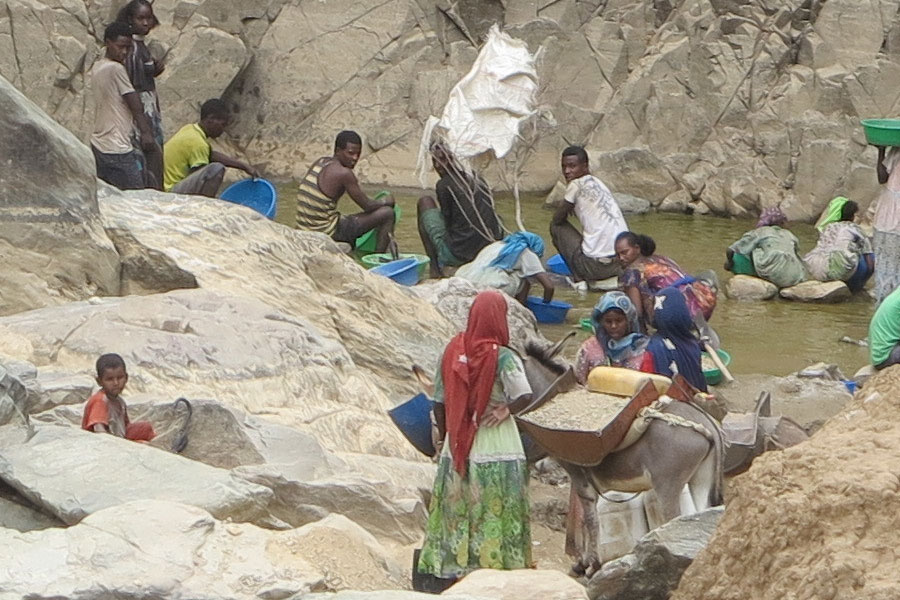
China has sneezed and dozens of countries around the world have caught a cold. The Novel Coronavirus Disease 2019 (COVID-19), a respiratory illness that began in the Wuhan District of China, has infected over 100,000 people across the world and has claimed its first victim in Ethiopia - the economy.
A relatively new and tiny player in the global economy, Ethiopia has been hit as a result of restrictions and delays in the shipping of goods and travel of people. Local businesses that rely on raw materials, goods and skilled human power exported from China, Ethiopia’s biggest trade partner, have been afflicted most severely.
The virus, which has a mortality rate of between one and four percent, around 20 times higher than the seasonal flu, could cost the global economy 2.7 trillion dollars, according to the most ‘extreme’ projection by Bloomberg Economics.
This remains the case even as the rate of new cases in China has declined, while a growing number of cases continue to crop up in countries around the world, including South Korea, Italy, Iran and the United States. One local importer told Fortune that the global spread, and the subsequent economic ripple effect, has cost him about half of his expected revenues.
Ethiopian Airlines, the nation’s flagship carrier, has not been breathing light either. Passenger traffic to its four gateways in mainland China and one in Hong Kong have dropped by a fourth. As a result, the airline has cut flight capacity by 20pc and started to renegotiate contracts, including aircraft leases, scaling down the size of offices and reducing staff.
The difficulties the airline is experiencing are in line with the estimates of the International Air Transport Association (IATA). Airline share prices have fallen by a staggering 25pc, and estimates for global revenue losses in the industry for this year stand between 63 billion and 113 billion dollars, according to the IATA.
The virus, which has a mortality rate of between one and four percent, around 20 times higher than the seasonal flu, could cost the global economy 2.7 trillion dollars, according to the most ‘extreme’ projection by Bloomberg Economics. But the possible extent of its consequences for Ethiopia are unknown. In the best case scenario, the economic challenge it poses will last at least four months, according to economists.
You can read the full story here .
PUBLISHED ON
Mar 13,2020 [ VOL
20 , NO
1037]

Commentaries | Dec 16,2023

Radar | Jul 21,2024

View From Arada | Jun 15,2019

Radar | Dec 24,2022

Radar | Jun 25,2022

Covid-19 | Apr 08,2020

Radar | Jan 29,2022

Commentaries | Feb 24,2024

Radar | Jan 01,2024

Advertorials | Jun 05,2023

Dec 22 , 2024 . By TIZITA SHEWAFERAW
Charged with transforming colossal state-owned enterprises into modern and competitiv...

Aug 18 , 2024 . By AKSAH ITALO
Although predictable Yonas Zerihun's job in the ride-hailing service is not immune to...

Jul 28 , 2024 . By TIZITA SHEWAFERAW
Unhabitual, perhaps too many, Samuel Gebreyohannes, 38, used to occasionally enjoy a couple of beers at breakfast. However, he recently swit...

Jul 13 , 2024 . By AKSAH ITALO
Investors who rely on tractors, trucks, and field vehicles for commuting, transporting commodities, and f...

Jun 28 , 2025
Meseret Damtie, the assertive auditor general, has never been shy about naming names...

Jun 21 , 2025
A well-worn adage says, “Budget is not destiny, but it is direction.” Examining t...

Jun 14 , 2025
Yet again, the Horn of Africa is bracing for trouble. A region already frayed by wars...

Jun 7 , 2025
Few promises shine brighter in Addis Abeba than the pledge of a roof for every family...